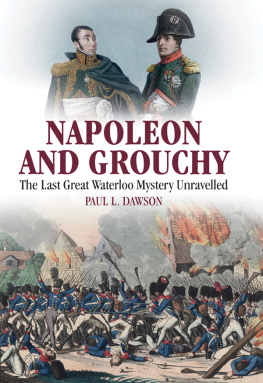This edition is published by PICKLE PARTNERS PUBLISHING
Text originally published in 1854 under the same title.
Pickle Partners Publishing 2011, all rights reserved. No part of this publication may be reproduced, stored in a retrieval system or transmitted by any means, electrical, mechanical or otherwise without the written permission of the copyright holder.
Publishers Note
Although in most cases we have retained the Authors original spelling and grammar to authentically reproduce the work of the Author and the original intent of such material, some additional notes and clarifications have been added for the modern readers benefit.
AS A TESTIMONY
of the profound admiration entertained for
His Lordship by every British soldier,
THIS WORK IS HUMBLY DEDICATED
TO HIS ILLUSTRIOUS CHIEF, FIELD-MARSHAL THE MOST NOBLE
THE MARQUIS OF ANGLESEY, R,G., G,C,B., G.C.H.,
by His Lordship's grateful servant,
E. Cotton, Sargeant-Major,
LATE 7TH HUSSARS.
PREFACE.
"A VOICE FROM WATERLOO" is the unassuming tale of an old soldier who was an eyewitness of and actor in many of the scenes he attempts to describe. His having resided more than fourteen years on the field, as Guide, and Describer of the battle, may be considered as the parent of the present memoirs {1} .
No one can be more convinced than I am, of my inability to do justice to the subject, but I have had great advantages in communicating personally on the spot with "Waterloo men" of every nation; all of whom, from the general to the private, have evidently considered it, at once, a duty and a pleasure to assist an old companion in arms. The inquiries and comments made by those gallant men, have afforded me opportunities of gleaning much information which no other person has obtained; this has enabled me to give a fuller and truer history of the battle, than a more talented man could have done, unless he had enjoyed the same privilege. I have also read the whole of the numerous accounts of the military operations of 1815, which have been published in French, English, and German.
General Jomini observes, that a soldier writes well enough if he can make himself understood. To write on military operations requires a soldier's pen, as no other can properly treat of military matters.
The reader will here find many new facts, and meet with several interesting and pertinent documents that have never before appeared in the English language; given with an accuracy and detail which I regard as quite my own.
One of my objects in writing is to correct opinions which have gone forth, and which are greatly at variance with facts: opinions so erroneous as to warrant the remark of the highly talented general already referred to, that "Never was a battle so confusedly described as that of Waterloo."
It is certain that the hour of many occurrences on the field has been erroneously stated; such as of the arrival, or rather becoming engaged, of the different Prussian corps; the fall of La Haye-Sainte, defeat of the Imperial guards, etc. {2}
Notwithstanding this, after the publication of so many accounts of the battle of the 18th of June, it may be fairly asked, upon what grounds I expect to awaken fresh interest in a subject so long before the public. Can I reconcile the conflicting statements which have already appeared in print? Can I add to the information which most of my countrymen already possess concerning this memorable epoch? Or can I present that information in a compendious and lucid form, such as the general reader may still want? Something in all these ways, I hope I have accomplished.
Putting aside some of the French and English accounts as not only irreconcileable with facts, but as self-refuted by their inconsistencies and mutual contradictions,using such of the French narratives as agree with those of their opponents, which, as Wellington observed of Napoleon's bulletins, may be safely relied upon as far as they tell against themselves,I have cleared up a great number of the points disputed by our own writers, who agree in the main, hut differ in some circumstances involving not merely questions of time and locality of certain events, but even the claims of individuals, regiments and brigades to the honour attached to their deeds on that day. By my long residence at Mont-St.-Jean, constant study of the surface of the battle field, knowledge of the composition and even dress of the different bodies of the French troops which stood before us, and my close attention to the remarks made by many a gallant comrade revisiting the spot, I have in a great measure succeeded in reconciling discrepancies which perhaps no other person could explain.
I am also emboldened to think that my "VOICE FROM WATERLOO" presents to the general reader all the leading facts of this eventful struggle, in so concise a manner, and at so moderate a cost, as to secure it a preference over every other narration of the battle. I feel confident that this work will furnish the visiter to the field, with a local guide not to be found in any description hitherto published.
In the Appendix to this work, No. VII, are testimonials of my more than common acquaintance with the incidents of the battle, testimonials left in my hands by some of the most distinguished officers who took part in the fight. Other documents of similar import I am proud to possess, and am ready to show to all who visit Waterloo.
Although not strictly belonging to "A VOICE FROM WATERLOO, I have added, as a connecting link in the narrative, an outline map, and a sketch of the military operations of the campaign of 1815.
Most anxious to avoid the imputation of having employed the materials of others without acknowledgment, I beg to state that, besides the various military periodicals, I have made use of captain Siborne's History of the War in France and Belgium {3} ; The Military Life of the Duke of Wellington, by major Basil Jackson {4} and captain R. Scott; The Wellington Despatches and General Orders, by colonel Gurwood; Fall of Napoleon, by colonel Mitchel; Political and Military Life of Napoleon; and The Art of War, by general Jomini; History of the King's German Legion, by major Beamish; Prussian History of the Campaign of 1815, by general Grollman, etc., etc.
As to the manner in which I have executed my task, I know I am open to criticism. No doubt many of my remarks will be considered too digressive. Some persons will think I am too hard upon Napoleon: my authorities in this are more frequently French than English. Others will judge me too partial to the immortal Wellington. Be it so: for I confess that I think it impossible to estimate his services too highly as a soldier, or as a statesman. Let no man contradict me until he has read the Despatches, etc. Is there another man on the records of history in whom we see such a combination of talent, patriotism, firmness, and perseverance? Even Napoleon confessed of him what he said of no other man: "In the management of an army he is fully my equal, and in prudence my superior." General Bertrand attested this. (







